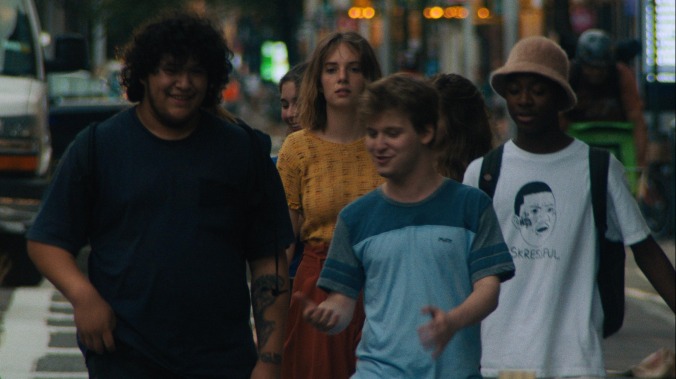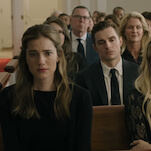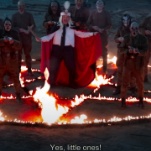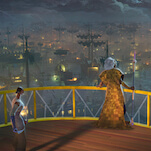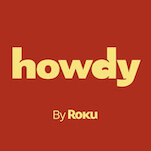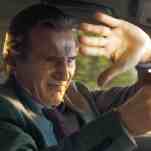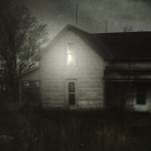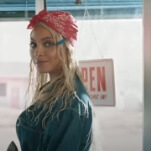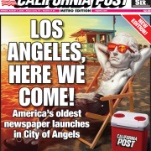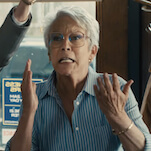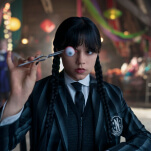The New York City walk-and-talk has become a signature for writer-director Adam Leon over the course of just a couple of movies. Different motivations may animate Leon’s films Gimme The Loot and Tramps, but his work still speaks a distinctive language of affectionate NYC patter, somewhere between open-hearted sharing and cocky bullshitting.
After an opening scene where she fails to recognize a young woman who clearly knows her, Studies jumps back in time to find Alina walking her dog in Manhattan. She ties the dog up outside a hardware store, enters, and quietly loses her bearing. When she emerges from the store in a daze, she walks on, unsure of a destination. She has forgotten the dog, and lost herself. Night falls, and Alina keeps walking, seemingly unwilling to seek help. If she can fake it here, she can fake it anywhere.
Italian Studies is not a harrowing, Wendy And Lucy-style pet-separation saga—though accidentally abandoning the pooch does offer immediate shorthand for the seriousness of her condition. While Leon’s scenes set on the streets and subways have an on-the-fly immediacy—at one point, dialogue must compete with automated subway announcements, just like in real life—it feels like Alina is stepping through a vivid but relatively uneventful dream. The film was assembled piecemeal over the course of several years, and leans into the ways that movies can simultaneously compress and widen time gaps with their shooting schedules. Initially, Alina wears short sleeves, and what seem like July 4th fireworks go off in the distance. Later, she acquires a sweater and a winter coat, and the streets are lined with slush. At another point, passers-by appear to be dressed for warmer weather. It also seems questionable whether Alina remembers the basic details of moving through New York: The way she sizes up and gingerly presses a button on an emergency-services kiosk in the subway, then freezes up when she’s connected to a human voice, suggests perhaps not.
Her time with Simon, too, is fragmented. They meet, they depart, they meet again, in defiance of Leon’s fondness for boy-girl pairings that unexpectedly stick together. As gregarious as Simon is, with his goofy Andy Samberg-ish grin, this experience belongs to Alina. Eventually, she figures out that she’s a writer, and her short story collection gives the movie its title. (“Not bad,” she notes approvingly to a stranger as she examines a copy of her own book in a library.) She then interviews Simon and a gaggle of his friends and acquaintances, claiming it’s for her follow-up novel. Is she simply bluffing her way through a new identity, or are these scenes mixing her memories with her talent for fiction? Some will undoubtedly tire of the ambiguities, even at a slim hour-and-change running time. (Officially, the movie is 79 minutes, but slow-rolling credits mean that it’s really closer to 70.)
Bits and pieces of Italian Studies resemble a couple of recent and more accessible movies from established filmmakers: The teenage interviews feel a bit like the radio piece that Joaquin Phoenix produces in C’mon C’mon, while the flirtation between a chatty teenage boy and an unmoored adult woman may bring to mind Licorice Pizza. Based on his past work, Leon has it in him to paint similarly open-hearted portraits; here he consciously leaves Alina more opaque.
But if anyone can make that opacity compelling, it’s Vanessa Kirby. This is a softer, smaller showcase for her than the Oscar-nominated melodrama of Pieces Of A Woman—and a better one, too. Through her guardedness, the flickers of panic chased with flashes of aggression, and her fleeting attachment to Simon, Kirby finds a character, even as that character struggles to find herself. The movie seems to be asking how much of our personhood could survive a temporary cleansing of the slate.
Italian Studies is a pre-COVID movie, depicting crowded and maskless New York streets; it premiered at the Tribeca Film Festival nearly a year ago, and was shot—with lovely nighttime tones from cinematographer Brett Jutkiewicz—well before that. Yet its effects are still enhanced by the “new normal” it’s being released into. The wistful feelings it generates about a world allowed to keep moving coexist alongside an uneasy evocation of brain fog, an easy stand-in for either a zombified endemic state or a specific long-COVID symptom—take your pick. Whatever the original motivation, Leon appears to sense, after a couple of sweet slice-of-life capers, that you can’t keep walking and talking forever.
